Asteroid (596) Scheila
in 2010
2010/12/12
2010/12/13 2010/12/14
2010/12/15
- According to the announcement of
CBET 2583, asteroid (596) Scheila, discovered by A. Kopff in Feb 21
1906, now is perplexingly displaying an conspicious cometary feature first
spotted by S. Larson, Lunar and Planetary Laboratory (LPL), University of
Arizona. He reports that images of the main-belt asteroid (596) Scheila,
taken on Dec. 11.44-11.47 UT with the 0.68-m f/1.8 Schmidt telescope at
Catalina, reveal that the object is in apparent outburst with a comet-like
appearance.
-
2010
Dec 15
|
2010/12/15 20:59
UT - 21:12 UT, 14" SCT f/6.9 + QHY9 CCD, BIN 2x2 90 sec x 10 exposure,
north up and east left |
|
Larsen-Sekanina
filter applied: Δr = 0.13, α
= 30° |
MPC observation computed with Astrometrica
using UCAC-2 star catalog:
- COD C42
OBS X.Gao, M.-T. Hui
MEA M.-T. Hui
TEL 0.36-m f/6.9 Schmidt-Cassegrain + CCD
NET UCAC-2
00596 C2010 12 15.87345 09
59 12.96 +28 30 44.0
13.6 V C42
00596 C2010 12 15.87461 09
59 12.97 +28 30 44.2
13.6 V C42
00596 C2010 12 15.87575 09
59 12.96 +28 30 44.5
13.6 V C42
00596 C2010 12 15.87691 09
59 12.98 +28 30 44.9
13.5 V C42
00596 C2010 12 15.87807 09
59 12.98 +28 30 45.3
13.5 V C42
00596 C2010 12 15.87922 09
59 13.00 +28 30 45.9
13.5 V C42
00596 C2010 12 15.88037 09
59 13.01 +28 30 46.2
13.5 V C42
00596 C2010 12 15.88152 09
59 13.02 +28 30 46.6
13.5 V C42
00596 C2010 12 15.88270 09
59 13.02 +28 30 47.1
13.5 V C42
00596 C2010 12 15.88385 09
59 13.06 +28 30 47.3
13.7 V C42
----- end -----
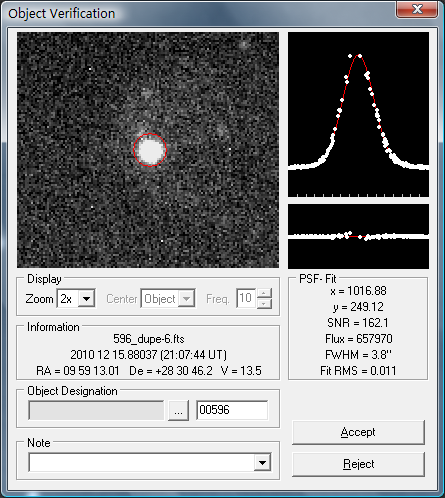
-
- Gauss curve produced by
Astrometrica with UCAC-2. The total PSF is using an aperture circle of
8 x
8 pixel around the brightest
pixel. We can see the Gauss curve
in the right is as the computed ideal line and the
real pixels contributed around the ideal line. The Fit RMS,
which inlays under the Gauss curve, is the deviation from the
ideal line.
- Photometry result computed with FOCAS II,
which processes images based upon the .LOG file of Astrometrica, by means of
Multibox method:
- COD C42
CATALOG: USNO A2.0 / CMC-14 - BAND: R
10x10 20x20 30x30
40x40 50x50 60x60
SNR SB
COD
OBJECT DATE
TIME +/- +/-
+/- +/- +/- +/-
N FWHM CAT
------------ ---------- -------- -----
----- ----- -----
----- ----- ----
---- ---
00596
15/12/2010 21:05:14 13.65 13.54
13.47 13.40 13.34
13.29 151.8 17.4
C42
00596
15/12/2010 21:05:14* 0.01
0.02 0.01
0.02 0.02
0.02 10
3.8 USN
FoCAs II - 17/03/2010
www.astrosurf.com/cometas-obs
es.groups.yahoo.com/group/Cometas_Obs
- Interpretation of the FOCAS II table
headings:
-
-
- Fisrt line:
-
- OBJECT,
DATE, TIME: refering to their original meanings respectively
-
- 10x10,
20x20 ... 60x60: the aperture sizes of photometry in term of
rectangle in arcsec that are used to measure an object's magnitude
-
- SNR:
the Signal-to-Noise Ratio for aperture photometry
-
- SB:
stars of faintest magnitude on the images used in data reduction with
the used star catalog in Astrometrica, rather than the stars of faintest
magnitude in the images
-
- COD:
MPC Code of the observatory
-
-
-
- Second line:
-
- +/-:
precisions of measurement
-
- N:
the number of used images for measurement
-
- FWHM:
Full-Width-Half-Maximum of total PSF, relevant to degree of seeing
-
- CAT:
the used star catalog in Astrometrica
-
-
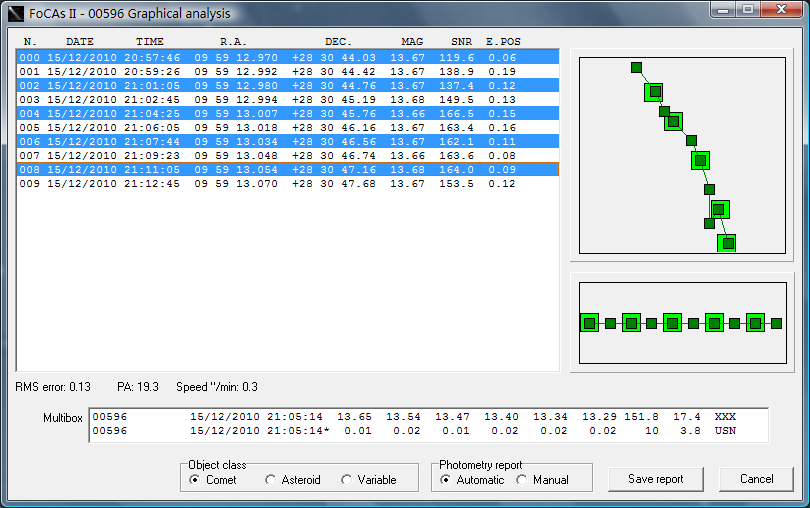
-
2010
Dec 14
|
2010/12/14 19:39
UT - 19:52 UT, 14" SCT f/6.9 + QHY9 CCD, BIN 2x2 90 sec x 10 exposure,
north up and east left |
|
Larsen-Sekanina
filter applied: Δr = 0.13, α
= 30° |
MPC observation computed with Astrometrica
using UCAC-2 star catalog:
- COD C42
OBS X.Gao, M.-T. Hui
MEA M.-T. Hui
TEL 0.36-m f/6.9 Schmidt-Cassegrain + CCD
NET UCAC-2
00596 C2010 12 14.81762 09
59 00.65 +28 24 32.6
13.6 V C42
00596 C2010 12 14.81877 09
59 00.66 +28 24 33.1
13.6 V C42
00596 C2010 12 14.81994 09
59 00.69 +28 24 33.6
13.6 V C42
00596 C2010 12 14.82109 09
59 00.67 +28 24 33.7
13.6 V C42
00596 C2010 12 14.82233 09
59 00.69 +28 24 34.2
13.6 V C42
00596 C2010 12 14.82347 09
59 00.72 +28 24 34.7
13.6 V C42
00596 C2010 12 14.82464 09
59 00.72 +28 24 34.8
13.6 V C42
00596 C2010 12 14.82579 09
59 00.76 +28 24 35.2
13.6 V C42
00596 C2010 12 14.82694 09
59 00.75 +28 24 35.6
13.6 V C42
00596 C2010 12 14.82810 09
59 00.79 +28 24 36.2
13.6 V C42
----- end -----
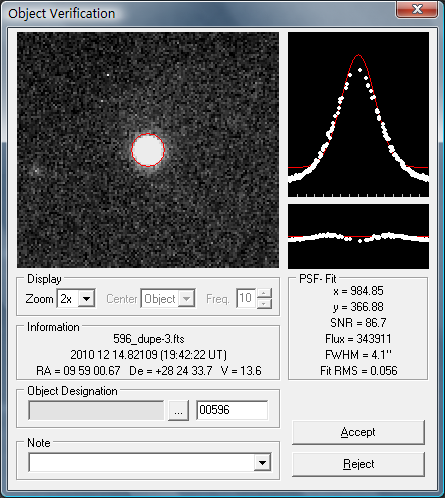
-
- Gauss curve produced by
Astrometrica with UCAC-2. The total PSF is using an aperture circle of
8 x
8 pixel around the brightest
pixel. We can see the Gauss curve
in the right is as the computed ideal line and the
real pixels contributed around the ideal line. The Fit RMS,
which inlays under the Gauss curve, is the deviation from the
ideal line.
- Photometry result computed with FOCAS II,
which processes images based upon the .LOG file of Astrometrica, by means of
Multibox method:
- COD C42
CATALOG: USNO A2.0 / CMC-14 - BAND: R
10x10 20x20 30x30
40x40 50x50 60x60
SNR SB
COD
OBJECT DATE
TIME +/- +/-
+/- +/- +/- +/-
N FWHM CAT
------------ ---------- -------- -----
----- ----- -----
----- ----- ----
---- ---
00596
14/12/2010 19:44:55 13.65 13.39
13.30 13.24
13.18 13.14 97.6
17.3 C42
00596
14/12/2010 19:44:55* 0.01
0.05 0.05
0.05 0.05
0.05 10
3.9 USN
FoCAs II - 17/03/2010
www.astrosurf.com/cometas-obs
es.groups.yahoo.com/group/Cometas_Obs
- Interpretation of the FOCAS II table
headings:
-
-
- Fisrt line:
-
- OBJECT,
DATE, TIME: refering to their original meanings respectively
-
- 10x10,
20x20 ... 60x60: the aperture sizes of photometry in term of
rectangle in arcsec that are used to measure an object's magnitude
-
- SNR:
the Signal-to-Noise Ratio for aperture photometry
-
- SB:
stars of faintest magnitude on the images used in data reduction with
the used star catalog in Astrometrica, rather than the stars of faintest
magnitude in the images
-
- COD:
MPC Code of the observatory
-
-
-
- Second line:
-
- +/-:
precisions of measurement
-
- N:
the number of used images for measurement
-
- FWHM:
Full-Width-Half-Maximum of total PSF, relevant to degree of seeing
-
- CAT:
the used star catalog in Astrometrica
-
-
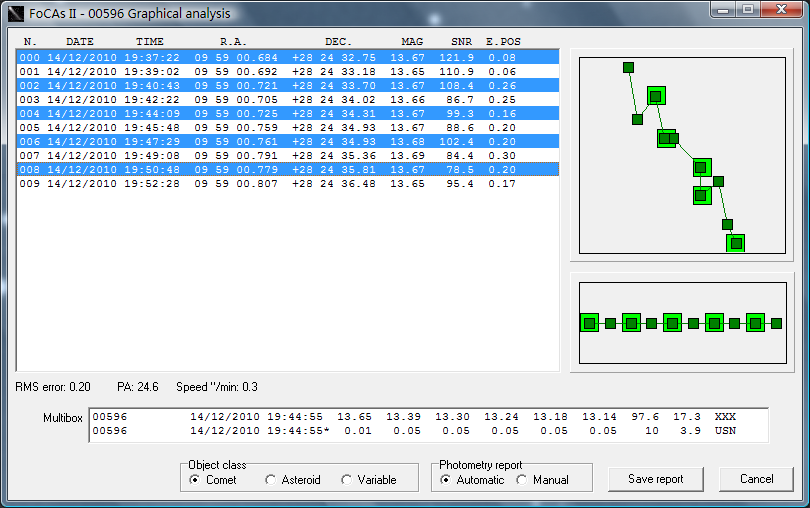
-
2010
Dec 13
|
2010/12/13 19:04
UT - 19:17 UT, 14" SCT f/6.9 + QHY9 CCD, BIN 2x2 90 sec x 10 exposure,
north up and east left |
|
Larsen-Sekanina
filter applied: Δr = 0.25, α
= 30° |
MPC observation computed with Astrometrica
using UCAC-2 star catalog:
- COD C42
OBS X.Gao, M.-T. Hui
MEA M.-T. Hui
TEL 0.36-m f/6.9 Schmidt-Cassegrain + CCD
NET UCAC-2
00596 C2010 12 13.79448 09
58 47.23 +28 18 41.4
13.8 V C42
00596 C2010 12 13.79564 09
58 47.27 +28 18 41.7
13.8 V C42
00596 C2010 12 13.79678 09
58 47.22 +28 18 42.1
13.8 V C42
00596 C2010 12 13.79794 09
58 47.25 +28 18 42.4
13.4 V C42
00596 C2010 12 13.79911 09
58 47.23 +28 18 42.6
13.2 V C42
00596 C2010 12 13.80025 09
58 47.29 +28 18 43.3
13.8 V C42
00596 C2010 12 13.80141 09
58 47.34 +28 18 43.9
13.8 V C42
00596 C2010 12 13.80256 09
58 47.34 +28 18 44.2
13.8 V C42
00596 C2010 12 13.80374 09
58 47.32 +28 18 44.4
13.8 V C42
00596 C2010 12 13.80492 09
58 47.37 +28 18 44.9
13.8 V C42
----- end -----
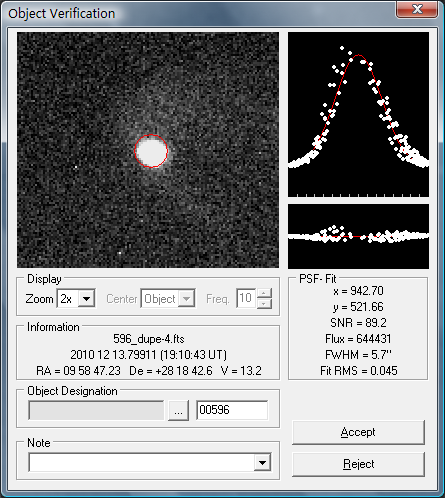
-
- Gauss curve produced by
Astrometrica with UCAC-2. The total PSF is using an aperture circle of
8 x
8 pixel around the brightest
pixel. We can see the Gauss curve
in the right is as the computed ideal line and the
real pixels contributed around the ideal line. The Fit RMS,
which inlays under the Gauss curve, is the deviation from the
ideal line.
- Photometry result computed with FOCAS II,
which processes images based upon the .LOG file of Astrometrica, by means of
Multibox method:
- COD C42
CATALOG: USNO A2.0 / CMC-14 - BAND: R
10x10 20x20 30x30
40x40 50x50 60x60
SNR SB
COD
OBJECT DATE
TIME +/- +/-
+/- +/- +/- +/-
N FWHM CAT
------------ ---------- -------- -----
----- ----- -----
----- ----- ----
---- ---
00596
13/12/2010 19:11:32 13.73 13.50 13.40 13.32 13.25 13.20 96.8 17.4 C42-
00596
13/12/2010 19:11:32* 0.02
0.02 0.02 0.02
0.02 0.02
10 4.0 USN
FoCAs II - 17/03/2010
www.astrosurf.com/cometas-obs
es.groups.yahoo.com/group/Cometas_Obs
- Interpretation of the FOCAS II table
headings:
-
-
- Fisrt line:
-
- OBJECT,
DATE, TIME: refering to their original meanings respectively
-
- 10x10,
20x20 ... 60x60: the aperture sizes of photometry in term of
rectangle in arcsec that are used to measure an object's magnitude
-
- SNR:
the Signal-to-Noise Ratio for aperture photometry
-
- SB:
stars of faintest magnitude on the images used in data reduction with
the used star catalog in Astrometrica, rather than the stars of faintest
magnitude in the images
-
- COD:
MPC Code of the observatory
-
-
-
- Second line:
-
- +/-:
precisions of measurement
-
- N:
the number of used images for measurement
-
- FWHM:
Full-Width-Half-Maximum of total PSF, relevant to degree of seeing
-
- CAT:
the used star catalog in Astrometrica
-
-
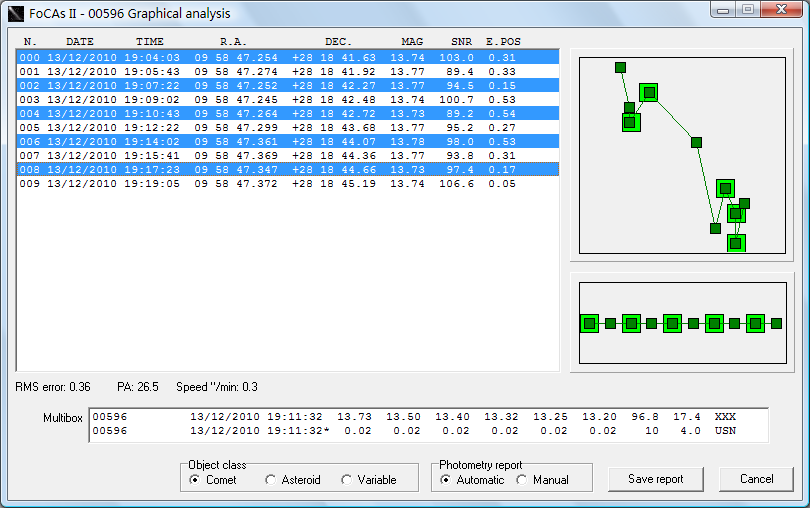
-
2010
Dec 12
|
2010/12/12 21:57
UT - 23:30 UT, 14" SCT f/6.9 + QHY9 CCD, BIN 2x2 1 min x 5 exposure,
north up and east left |
|
Larsen-Sekanina
filter applied: Δr = 0.13, α
= 30° |
MPC observation computed with Astrometrica
using UCAC-2 star catalog:
- COD C42
OBS X.Gao, M.-T. Hui
MEA M.-T. Hui
TEL 0.36-m f/6.9 Schmidt-Cassegrain + CCD
NET UCAC-2
00596 tC2010 12 12.90361 09 58
34.14 +28 13 42.9 13.6
V C42
00596 C2010 12 12.90481 09
58 34.16 +28 13 43.1
13.6 V C42
00596 C2010 12 12.90597 09
58 34.18 +28 13 43.6
13.5 V C42
00596 C2010 12 12.90712 09
58 34.20 +28 13 44.1
13.6 V C42
00596 C2010 12 12.90828 09
58 34.21 +28 13 44.4
13.5 V C42
----- end -----
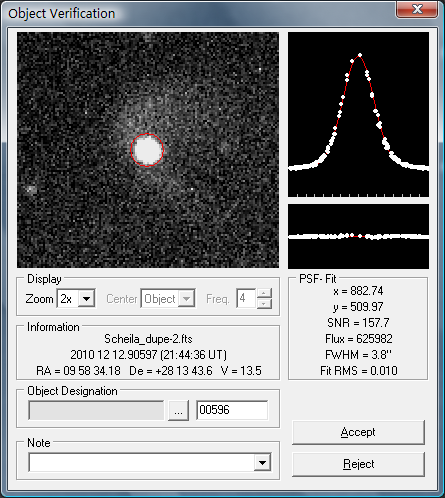
-
- Gauss curve produced by
Astrometrica with UCAC-2. The total PSF is using an aperture circle of
8 x
8 pixel around the brightest
pixel. We can see the Gauss curve
in the right is as the computed ideal line and the
real pixels contributed around the ideal line. The Fit RMS,
which inlays under the Gauss curve, is the deviation from the
ideal line.
- Photometry result computed with FOCAS II,
which processes images based upon the .LOG file of Astrometrica, by means of
Multibox method:
- COD C42
CATALOG: USNO A2.0 / CMC-14 - BAND: R
10x10 20x20 30x30
40x40 50x50 60x60
SNR SB
COD
OBJECT DATE
TIME +/- +/-
+/- +/- +/- +/-
N FWHM CAT
------------ ---------- -------- -----
----- ----- -----
----- ----- ----
---- ---
00596
12/12/2010 21:44:34 13.67 13.49 13.39 13.29 13.21 13.15
135.3 17.4 C42
00596
12/12/2010 21:44:34* 0.01
0.06 0.06
0.06 0.06
0.06 5
3.8 USN
FoCAs II - 17/03/2010
www.astrosurf.com/cometas-obs
es.groups.yahoo.com/group/Cometas_Obs
- Interpretation of the FOCAS II table
headings:
-
-
- Fisrt line:
-
- OBJECT,
DATE, TIME: refering to their original meanings respectively
-
- 10x10,
20x20 ... 60x60: the aperture sizes of photometry in term of
rectangle in arcsec that are used to measure an object's magnitude
-
- SNR:
the Signal-to-Noise Ratio for aperture photometry
-
- SB:
stars of faintest magnitude on the images used in data reduction with
the used star catalog in Astrometrica, rather than the stars of faintest
magnitude in the images
-
- COD:
MPC Code of the observatory
-
-
-
- Second line:
-
- +/-:
precisions of measurement
-
- N:
the number of used images for measurement
-
- FWHM:
Full-Width-Half-Maximum of total PSF, relevant to degree of seeing
-
- CAT:
the used star catalog in Astrometrica
-
-
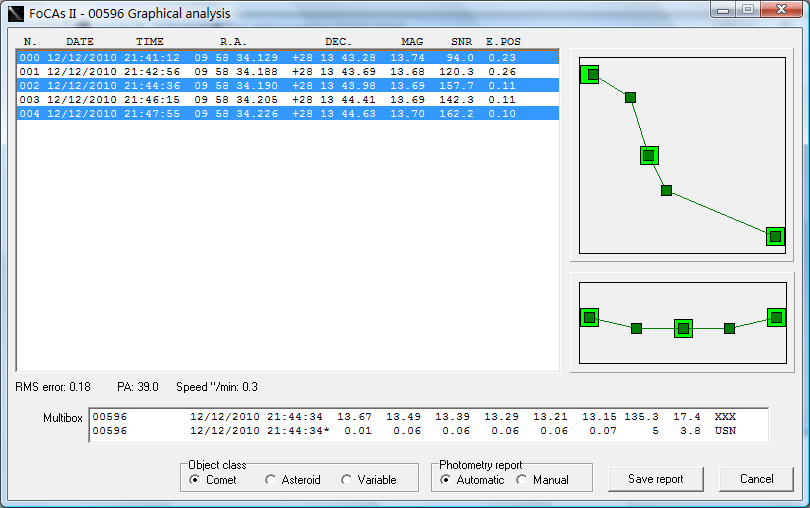
-
Copyright @ Man-To
Hui
2010/12/19
Feel free to e-mail
me with any doubts or questions.
Top
Back...
-- Zurück...
Home







